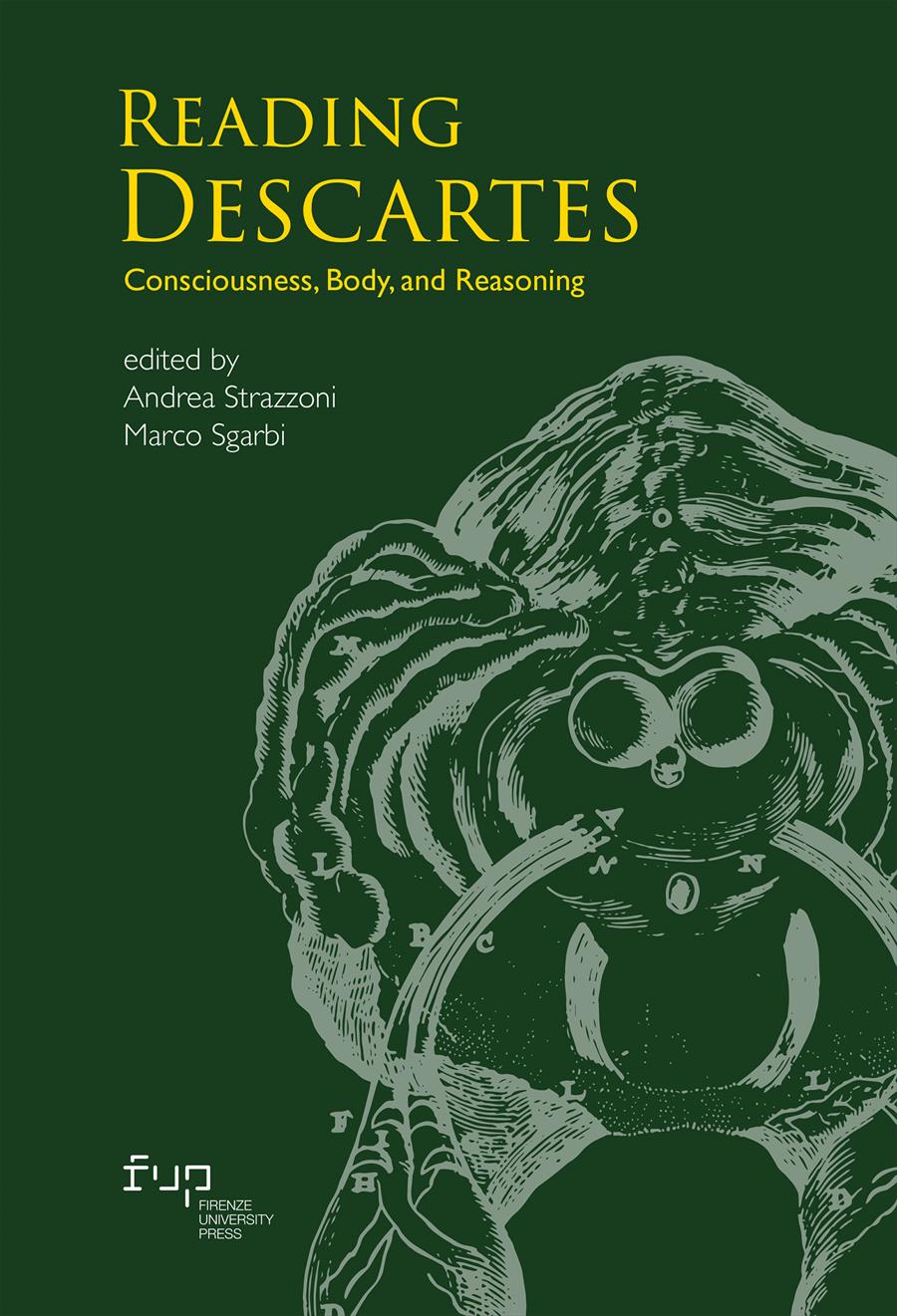- Reading Descartes
- Edited by Andrea Strazzoni, Marco Sgarbi
Consciousness without Existence: Descartes, Severino and the Interpretation of Experience
- Andrea Sangiacomo
- © 2023 Author(s) |
- CC BY 4.0
- DOI: 10.36253/979-12-215-0169-8.10
Consciousness is connected with the fact that a subject is aware and open to the manifestation of whatever appears. Existence, by contrast, is used to express the fact that something is given in experience, is present, or is real. Usually, the two notions are taken to be somehow related. This chapter suggests that existence is at best introduced as a metaphysical (or meta-experiential) concept that inevitably escapes the domain of conscious experience. In order to illustrate this claim, two case studies are considered. The first case is provided by Descartes’s famous treatment of consciousness and existence in his Meditations on First Philosophy. The second case is meant to contrast the Cartesian approach by taking the opposite route, as delineated by Emanuele Severino (1929–2020) in his ‘fundamental ontology’.
- Keywords:
- René Descartes,
- Emanuele Severino,
- consciousness,
- existence,
University of Groningen, Netherlands - ORCID: 0000-0001-7529-9826
- Adriaenssen, Han T. 2017. Representation and Scepticism from Aquinas to Descartes. Cambridge: Cambridge University Press.
- Carraud, Vincent. 2022. Causa sive ratio. La raison de la cause, de Suarez à Leibniz. Paris: Presses Universitaires de France.
- Christofidou Andrea. 2022. “Descartes’s Flash of Insight: Freedom, the Objective World, and the Reality of the Self.” The European Legacy 37 (3–4): 251–68.
- Descartes, René. 1964–19742 (1897–1913). Oeuvres, éditées par Charles Adam, et Paul Tannery, édition révue par Joseph Beaude, Pierre Costabel, Alan Gabbey, et Bernard Rochot (“AT”). Paris: J. Vrin.
- Descartes, René. 1984–1991. The Philosophical Writings of Descartes, volumes 1–2, edited and translated by John Cottingham, Robert Stoothoff, and Dugald Murdoch (“CSM”); volume 3, edited and translated by John Cottingham, Robert Stoothoff, Dugald Murdoch, and Anthony Kenny (“CSMK”). Cambridge: Cambridge University Press.
- Ganeri, Jonardon. 2007. The Concealed Art of the Soul. Theories of Self and Practices of Truths in Indian Ethics and Epistemology. New York: Oxford University Press.
- Jorgensen, Larry M. 2020. “Seventeenth-Century Theories of Consciousness.” In The Stanford Encyclopedia of Philosophy, edited by Edward N. Zalta. Accessed 12 December, 2022 <https://plato.stanford.edu/archives/spr2020/entries/consciousness-17th/>.
- Nadler, Steven. 1989. Arnauld and the Cartesian Philosophy of Ideas. Princeton: Princeton University Press.
- Sangiacomo, Andrea. 2020. Teoria del silenzio. Esperienza originaria e linguaggio a partire da G. B. Vico. Milano: Mimesis.
- Sangiacomo, Andrea. 2022. “Creationism and Eternalism in Contemporary Italian Metaphysics: Critical Notes on Leonardo Messinese’s La via della metafisica.” Giornale di Metafisica 20 (2): 581–90.
- Sangiacomo, Andrea. 2022. “The Meaning of Existence (Bhava) in the Pāli Discourses of the Buddha.” British Journal for the History of Philosophy. DOI: 10.1080/09608788.2022.2107998
- Severino, Emanuele. 19812 (1958). La struttura originaria. Milan: Adelphi.
- Severino, Emanuele. 19822 (1972). Essenza del nichilismo. Milan: Adelphi.
- Severino, Emanuele. 2001. La gloria. Milan: Adelphi.
- Severino, Emanuele. 2005. Fondamento della contraddizione. Milan: Adelphi.
- Severino, Emanuele. 2007. Oltrepassare. Milan: Adelphi.
- Severino, Emanuele. 2011. La morte e la terra. Milan: Adelphi.
- Severino, Emanuele. 2016. Essence of Nihilism, translated by G. Donis. London: Verso.
- Severino, Emanuele. 2018. Testimoniando il destino. Milan: Adelphi.
- Severino, Emanuele. 2019. “Phenomenology, Freedom, Causality, and the Origin of Western Civilization.” In Determinism and Free Will. New Insights from Physics, Philosophy and Theology, edited by Fabio Scardigli, Gerard ’t Hooft, Emanuele Severino, and Piero Coda, 49–77. Dordrecht: Springer.
- Siderits, Mark, Tillemans Tom, and Arindam Chakrabarti, edited by. 2011. Apoha. Buddhist Nominalism and Human Cognition. New York: Columbia University Press.
- Simmons, Alison. 2012. “Cartesian Consciousness Reconsidered.” Philosophers’ Imprint 12 (2). Accessed 12 December, 2022. <http://hdl.handle.net/2027/spo.3521354.0012.002>.
- Thiel, Udo. 2011. The Early Modern Subject. Self-consciousness and Personal Identity from Descartes to Hume. Oxford: Oxford University Press.
- Westerhoff, Jan. 2020. The Non-Existence of the Real World. Oxford: Oxford University Press.
Chapter Information
Chapter Title
Consciousness without Existence: Descartes, Severino and the Interpretation of Experience
Authors
Andrea Sangiacomo
Language
English
DOI
10.36253/979-12-215-0169-8.10
Peer Reviewed
Publication Year
2023
Copyright Information
© 2023 Author(s)
Content License
Metadata License
Bibliographic Information
Book Title
Reading Descartes
Book Subtitle
Consciousness, Body, and Reasoning
Editors
Andrea Strazzoni, Marco Sgarbi
Peer Reviewed
Number of Pages
206
Publication Year
2023
Copyright Information
© 2023 Author(s)
Content License
Metadata License
Publisher Name
Firenze University Press
DOI
10.36253/979-12-215-0169-8
ISBN Print
979-12-215-0168-1
eISBN (pdf)
979-12-215-0169-8
eISBN (epub)
979-12-215-0170-4
Series Title
Knowledge and its Histories
Series ISSN
3035-5974
Series E-ISSN
3035-5923
